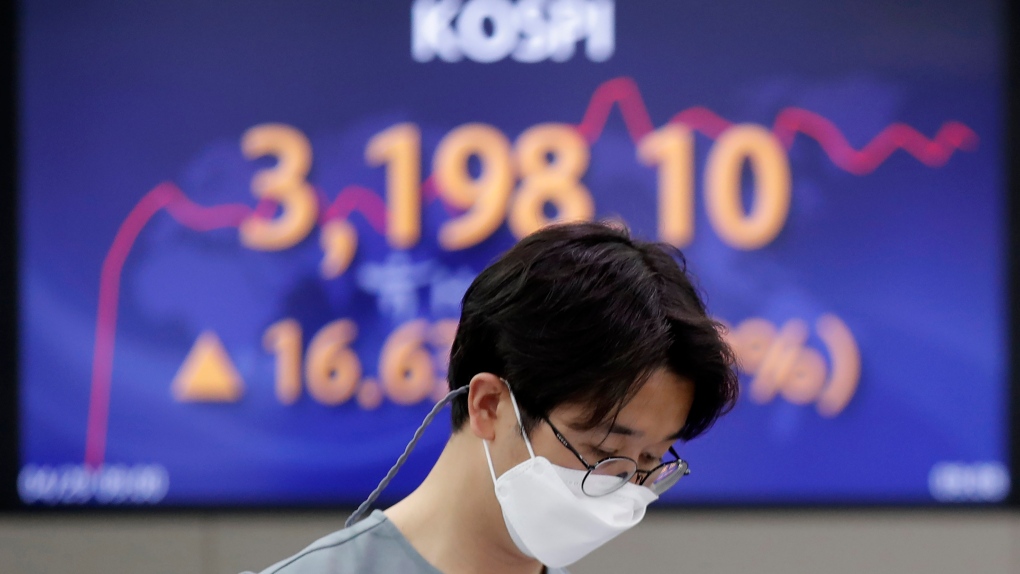Stock market: Asian stocks mixed after muddled day of trading on Wall St
[ad_1]
Stocks were mixed in Asia on Wednesday as traders waited for updates on inflation and corporate earnings.
Shares rose in Shanghai after customs data showed exports increased in September, although imports slowed sharply. The Shanghai Composite Index jumped 0.6% to 3,566.24.
Tokyo’s Nikkei 225 index fell 0.3% to 28,140.28 and the S & P / ASX 200 edged down 0.1% to 7,272.50. Seoul’s Kospi gained 1% to 2,944.41.
Hong Kong markets were closed as a precaution due to an approaching typhoon.
Markets have been turbulent for weeks as investors try to figure out how the economy will continue to recover, with COVID-19 remaining a threat and rising inflation can hurt consumer spending and business finances.
China’s producer price index is due on Thursday. Economists forecast an increase of more than 10% year-on-year, down from 9.5% in August.
Data released on Wednesday showed exports rose 28.1% in September to $ 305.7 billion. This was slightly faster than the 26% increase recorded in August, and better than economists’ forecasts. Imports rose 17.6% to $ 240 billion, down from 33% the previous month.
Investors will also be watching closely for inflation updates from the US Department of Labor, which will release its Consumer Price Index for September on Wednesday.
It is a measure of how inflation is putting cost pressure on consumers. More information on inflationary pressures for businesses is expected on Thursday when the Labor Ministry releases its producer price index.
The prices of oil and other energy have skyrocketed along with the costs of other commodities. Meanwhile, semiconductor shortages have slowed the production of many high-value industrial goods such as cars and consumer electronics.
On Tuesday, the major indices hovered between small gains and losses for much of the day on Wall Street, before sales picked up steam in the final minutes of trading. The S&P 500 slipped 0.2% to 4,350.65. The Dow Jones fell 0.3% to 34,378.34. The Nasdaq slipped 0.1% to 14,465.92.
Smaller company stocks, an indicator of confidence in economic growth, outperformed the market as a whole, pushing the Russell 2000 Index up 0.6% to 2,234.27.
The decline in the S&P 500 marked the index’s third consecutive decline. After two days, the index’s losses offset its 0.8% gain last week.
The 10-year Treasury yield fell to 1.58% from 1.60% on Friday night. The bond market was closed Monday for Columbus Day.
The decision by the International Monetary Fund to slightly downgrade its outlook for a global recovery from the pandemic recession also cast a shadow.
The IMF said on Tuesday it was forecasting global growth this year of 5.9%, down from a 6% growth projection made in July. He said the change reflected continuing supply chain disruptions in industrialized countries and deadly disparities in immunization rates between rich and poor countries.
The next round of earnings reports will give Wall Street a clearer picture of how businesses are doing in the last quarter amid an increase in COVID-19 cases. It will also provide a better understanding of how they expect to behave during the rest of the year.
S&P 500 companies are expected to post 27.6% annual profit growth for the July-September quarter, according to FactSet. This is down from the 28.1% growth estimated by analysts in July.
JPMorgan Chase will release the banks’ results on Wednesday. Bank of America, Wells Fargo and Citigroup will follow with their latest quarterly results on Thursday.
Many industries are feeling the effects of rising inflation with higher costs for shipping and raw materials. Companies warn their bottom lines could suffer due to supply chain issues.
The tightening of the supply chain has also raised the prices of many products for consumers, which could hurt consumer spending and further delay economic recovery. Investors will receive an update on consumer spending when the Commerce Department releases its September retail sales report on Friday.
In other exchanges, US benchmark crude oil lost 5 cents to $ 80.59 per barrel in electronic trading on the New York Mercantile Exchange. It gained 12 cents to $ 80.64 a barrel on Tuesday.
Brent crude, the international standard, fell 3 cents to $ 83.39 a barrel.
The US dollar slipped to 113.48 Japanese yen from 113.59 yen on Tuesday night. The euro went from $ 1.1553 to $ 1.1553.
[ad_2]

